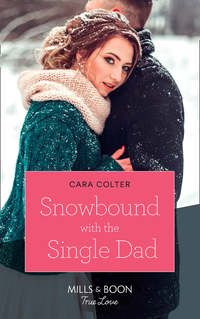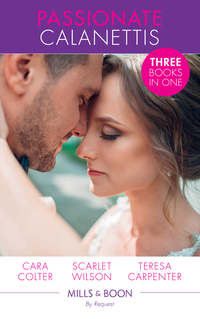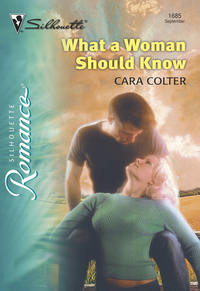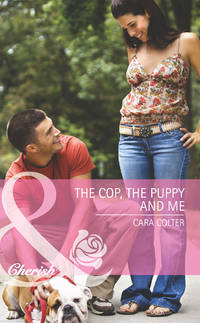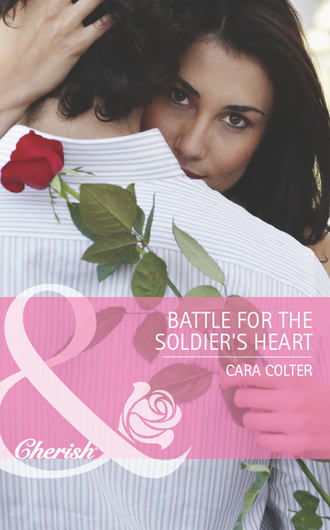
Полная версия
Battle for the Soldier's Heart

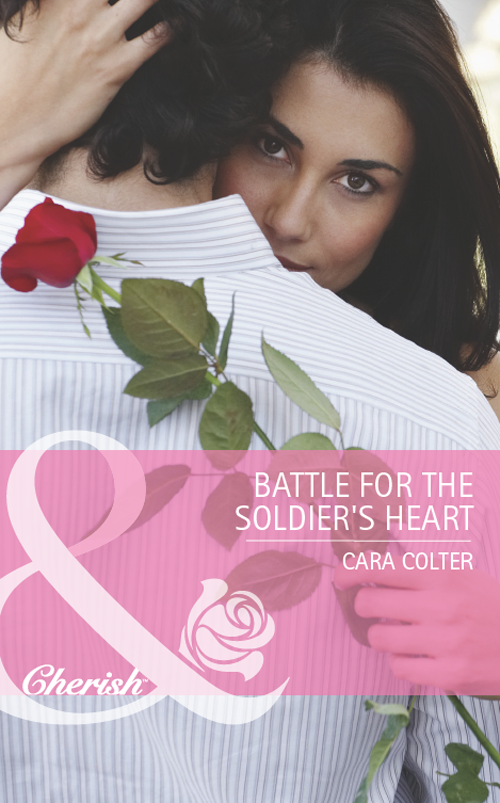
“You’re hopelessly distrustful.”
Suddenly the defiance left her expression. Rory wished he would have had time to get ready for what she did next. Grace laid her hand on his wrist.
Everything she was was in that touch. The way she was dressed tried to say one thing about her: that she was a polished and successful businesswoman. But her touch said something entirely different. That she was gentle, a little naïve, hopeful about life. She was too soft and too gullible. He was not sure how she had managed to remain that way through life’s tragedies—the death of her brother, the break-up of her engagement. There was a kind of courage in it that he reluctantly admired even while he felt honor-bound to discourage it.
He both admired her hope and wanted to kill it before it did some serious damage.
Grace turned and looked at Rory, those amazing eyes dancing with the most beautiful light. And the light in her eyes was doing the strangest thing to him. Grace’s light was piercing the darkness in him, bringing brightness to a place that had not seen it for a long, long time.
He did not allow himself to marvel at it. He thrust the feeling of warmth away. His darkness could put out her light in a millisecond. And he’d better remember that when he was thinking about how beautiful Graham’s kid sister had become.
Dear Reader,
I’ve just had another perfect summer. I had the opportunity to do plenty of swimming in two of the world’s most wonderful lakes: Lake Pend O’reille in Idaho, and Kootenay Lake in BC, in Canada. I also had lots of company this summer, ate ice cream, drank iced cappuccinos and sat in the shade just contemplating life.
And while I was having this fantastic, carefree summer so many young men and women who have answered the call to protect their nations were so far from home.
I write about soldiers because I have always thought it takes a special kind of courage to leave all the comforts (that I generally take for granted) behind. I am aware that the peace and prosperity I enjoy are ultimately linked to a young stranger’s willingness to serve and to sacrifice.
So this one is dedicated to them, with heartfelt gratitude.
Cara Colter
About the Author
CARA COLTER lives on an acreage in British Columbia with her partner Rob and eleven horses. She has three grown children and a grandson. She is a recent recipient of the RT Book Reviews Career Achievement Award in the Love and Laughter category. Cara loves to hear from readers, and you can contact her or learn more about her through her website, www.cara-colter.com
Battle for the
Soldier’s Heart
Cara Colter

www.millsandboon.co.uk
To all the men and women who serve,
with deepest gratitude.
CHAPTER ONE
THERE were Shetland ponies everywhere.
They were gobbling the long strands of grass that sprouted around the brightly painted legs of the children’s playground equipment. They were chowing down on the weeping-willow fronds at the edge of the duck pond.
Three had found their way through the chain-link fence and were grazing with voracious appetite on the green temptations of the Mason Memorial Soccer Field.
One had its face buried in the remnants of a birthday cake, and another, wandering toward the wading pool, was trailing a banner that said Happy Birthday, Wilson Schmelski.
From where he stood at the pedestrian bridge that crossed into the city of Mason’s most favored civic park, Pondview, Rory Adams counted eight ponies on the loose.
And only one person trying to catch them.
“You little monster! You beady-eyed ingrate!”
The woman lunged right, the pony left.
If it had been anyone else, he might have allowed himself to see the humor in her predicament.
Instead, he frowned. When he thought of Gracie Day, somehow, even after speaking to her on the phone, he hadn’t factored in the passage of time. She was frozen in his mind at fourteen or fifteen. All glittering braces and freckles, skinned knees, smart-alecky and annoying.
To him, six years her senior, Gracie, his best friend’s little sister, had not even been a blip on his radar. He had not considered her a girl in the sense that he considered girls. And at that age? Had he ever considered anything but girls?
He’d been twenty-one when he saw her last. He and Graham mustering out, on their first tour of Afghanistan, and her looking at him with fury glittering in her tear-filled eyes. I hate you. How could you talk him into this?
Graham had started to argue—the whole let’s-go-play-soldier thing had been his idea, after all—but Rory had nudged him, and Graham had understood instantly.
Let me take it, let me be the bad guy in your kid sister’s eyes.
The memory made him wince. They had looked out for each other. They’d had each other’s backs. Probably thousands of times since they had said good-bye to Gracie that day. But the one time it had really counted…
Rory shook off the thoughts, and focused on the woman chasing ponies.
That kid sister.
Gracie Day was small and slender, deliciously curved in all the right places. Auburn hair that had probably started the day perfectly controlled and prettily coiffed, had long since surrendered to humidity and the pitfalls of pony-chasing. Her hair was practically hissing with bad temper and fell in a wild wave to her bare sun-kissed shoulders.
She was daintily dressed in a wide-skirted cream sundress and matching heels that had probably been perfect for the children’s birthday party her event-planning company had just hosted.
But if Gracie had worked at it, she couldn’t have chosen a worse outfit for chasing ponies.
The dress was looking rumpled, one slender strap kept sliding off her shoulder, and not only couldn’t she get up any speed in those shoes, but the heels kept turning in the grass. At first glance, the smudge on the delectable rise of her bosom might have been mistaken for part of the pattern on the dress. But a closer look—that was not the bosom she’d had at fourteen—and he was pretty sure the bright-green splotch was horse slobber.
“Do you have any idea what glue is made from? Do you?”
Something still in her, then, of that fourteen-year-old girl she had once been. That girl was closer to the surface than the cool, calm and collected Gracie Day she had managed to convince him she was when he had spoken to her on the phone.
“I need to talk to you,” he’d said, when he’d finally made it home. By then Graham had already been gone for six months. He’d wanted to tell her the truth.
I failed.
“I can’t see why we would need to talk,” she’d responded, and the fact was, he’d been relieved.
Talking about what had happened to Graham—and his part in it—was not going to be easy. And while he was not a man who shirked hard things, he had been thankful for the reprieve.
Rory felt a shiver along his spine. They said it was survivor’s guilt, but in his heart he felt it was his fault her brother hadn’t come home.
Somehow, instead of being a temporary diversion, playing soldier had turned into a career for both of them. Graham, on their third deployment, Afghanistan again, had taken a bullet.
Rory still woke almost every night, sweating, his heart pounding.
Two teenage boys. Something about them. He’d hesitated because they were so young. And then bullets everywhere. Ducking, taking cover. Where was Graham? Out there. Crawling out, pulling him back, cradling him in his arms.
Blood, so much blood.
But the dream woke him before it was done. There was a piece missing from it, words he could not remember though he chased after them once he was awake.
The dream never told him what he needed to know. Had it been those boys? Were they the ones who had fired those shots? What could he have done differently? Could he have shoved Graham behind him, taken it instead?
Check up on Gracie. Those words whispered, a plea.
You didn’t take a dying request lightly. And especially not the dying request of the man who’d been his best friend for more than ten years.
So, back home for six months now, Rory had tried. He called Gracie twice, and admittedly had been somewhat relieved to have been coolly rejected each time. The dreams were bad enough without the reality of having to tell her what had happened, while at the same time sparing her what had happened.
And so, he had followed the letter of Graham’s instruction and checked up on her. While he had been away, the company he and his own brother had started—they had begun with race-car graphics and were now taking on the world—had succeeded beyond his wildest dreams. Once home, done with the military for good, Rory Adams was amazed to find himself a man with considerable resources.
One of whom was named Bridey O’Mitchell. Officially, she was his personal assistant. Unofficially, he considered her his secret weapon.
Bridey, middle-age, British, unflappable, could accomplish anything. Some days, Rory entertained himself by finding impossible challenges for her.
Can you get ice cream delivered to that crew working on the graphics for those Saudi airplanes? I know it’s short notice, but do you think you could find half a dozen tickets to the sold-out hockey game? I’d like a koala bear and two kangaroos at the opening of that Aussie tour company we did the buses for.
Checking up on Gracie Day? That had been child’s play for Bridey.
And the ensuing report about Gracie Day had been soothingly dull. Gracie was no longer engaged to the fiancé Graham had disliked intensely, and she ran a successful event-planning company, Day of Your Life, here in Mason, in the Okanagan Valley of British Columbia. Hers was the “it” company for weddings and anniversaries and special events.
The company had just been chosen to do the major annual fundraiser for Warrior Down, the organization that helped wounded vets and their families.
But Gracie’s bread and butter was birthday parties for the children of the well-heeled, politicians and doctors and lawyers and CEOs. She put together the kind of parties that had clowns in them. And bouncy tents. Maybe a magician. And fireworks. The ponies must be an added touch since Rory had received Bridey’s very thorough report.
Gracie Day organized the kind of parties that he had never had. In fact, he didn’t recall his birthday ever being celebrated, except on one memorable occasion when his mother had ended up face-first in the cake. How old had he been? Six? After that, he’d said no thanks to efforts at celebration.
There. He’d “checked up” on her. Even that little bit of checking had triggered a bad memory, so he wanted to let it go there. Grace Day was doing well.
Still, even as he tried to tell himself he’d obeyed the letter of Graham’s last instruction to him, it ate at the honor he had left. Rory had needed to see for himself that Gracie was doing all right. His last call had been a week ago.
And there had been something in her voice.
Even though she had said she was doing fabulously.
He couldn’t pinpoint what exactly he had heard in her voice. A certain forced note to the breezy tone? Something guarded, as if she had a secret that she was not planning on revealing to him?
Whatever it was, it wouldn’t let him go. Over the past week, the need to see her had grown in urgency. Instinct had become such a big part of his life when he was a soldier, that he found he couldn’t ignore that niggling little voice. When he tried, it was just one more thing that woke him in the night, that haunted his dreams.
A little lie to her secretary had sent him to Pondview. “My company is one of the sponsors of Warrior Down. I need to talk to her urgently. And in person.”
Just as he’d suspected, the mention of Gracie’s pet project got him all the information he needed. Did he feel guilty for lying?
No. Guilt was for guys of a sensitive nature, and he definitely did not qualify. In his house, growing up, later on the battlefield, that was how you stayed alive. You didn’t let things touch you.
But Graham dying… Rory shook it off, chose to focus with unnecessary intensity on Gracie. She was sneaking up on a fat black-and-white pony, who, while seeming oblivious, was clearly watching her out of the corner of his eye. She was right on one count: the pony was beady-eyed.
And a whole lot smarter than he looked. Because when she made her move, the pony sidled sideways, out of her grasp. He turned and looked at her balefully, chewing a clump of grass.
Rory winced when her heel embedded itself in the grassy ground, spongy from a recent watering and Gracie pitched forward. The heel snapped off her shoe with a click so audible Rory could hear it from where he was standing.
What was left of her cool reserve—and that wasn’t much—abandoned her. Rory found himself smiling when she pried her foot free, took off a shoe and hurled it at the pony, who kicked up its heels at her and farted as it dodged the shoe.
“Bad horses become glue,” she shouted. “And dog food. How would you like to be breakfast for a Great Dane?”
“Tut-tut,” Rory muttered to himself. “Your decorum doesn’t match your dress, Miss Day.”
The truth? He liked the Miss Day who would throw a shoe at a pony much more than the one who answered her phone with such cool reserve, or the one who ran perfect birthday parties in her designer duds.
But then, he knew enough about the real Miss Day that she would be appalled. That’s how bored guys whiled away their time. Played poker. Smoked. Slept. Talked.
About girlfriends and family.
Graham had never been that successful in the girlfriend department, so Rory knew an awful lot about his sister.
Like: Gracie just never lets loose. You know, ever since she was a little girl she’s carried a picture of a candy-apple red Ferrari. How did she become such a stick-in-the-mud? And how is it she’s going to marry a stick-in-the-mud accountant, least likely ever to own a sports car? He drives a car that would barely make the economy class at a car-rental agency!
Then, as if to prove her brother had her all wrong, that there was nothing stick-in-the-mud about her, Graham Day’s straitlaced sister, who didn’t know how to let loose, took off the other shoe and hurled it after the departing pony. She said a word—loudly—that soldiers used with fast and furious frequency but that would have raised a few eyebrows at her perfectly executed rich kids’ birthday party.
Rory felt a smile tickle at his lips. A long, long time since he had found much to smile about.
Still, it was more than evident it was a bad time to talk to her. Of course, the chivalrous thing to do would be to rescue her, to save the day, but he had given up any illusions of being a hero long, long ago. And more, Gracie would hate his catching her like this.
In a bad spot.
Vulnerable.
Out of control.
Needing his help.
Besides, he didn’t know anything about horses of the large variety, and less about the tiny ones.
Still, just leaving her to deal with it seemed too hard-hearted, even for him, the man generally untroubled by guilt.
But there it was: the memory of Graham required Rory to be a better man. Even if she was not his sister, Graham wouldn’t have approved of abandoning the damsel in her distress.
Rory remembered he had a step up on the other heroes out there. A secret weapon. He pulled his cell phone from his pocket and tried not to wince when Bridey answered, halfway through the first ring, with her chipper, “Mr. Adams, sir.”
He had tried to tell her his preference was for a more casual form of address, but on that topic she would not hear him.
Her tone reproachful, she was fond of reminding him, “Mr. Adams, you are the CEO of a very successful company.”
“Bridey, I need you to find me someone who can round up some escaped ponies.”
If the request took her by surprise, she certainly didn’t let on. She took all the details and assured him she was on it.
Rory made a decision to help Gracie Day save whatever pride she had left by sinking further back into the shadows of the park, to be an interested spectator, nothing more.
But just as he made that decision, Gracie froze. It reminded him of a deer sniffing the air, some sense alerting it that it no longer was alone, that it was being observed. Then Gracie turned her head slowly and looked directly at him.
He saw recognition dawn in her eyes, and then in the set of her mouth.
She folded her arms over the green smudge on her chest and lifted her chin, trying for composure, distancing herself from that woman who had been hurling shoes and shouting invective at horses.
Taking a deep breath, feeling a sensation in his chest that was similar to what he felt just before starting the mission, just before stepping into the heat of battle, Rory Adams moved toward Gracie.
And stopped right in front of her.
Had he ever known her eyes were that color? He thought it was called hazel, a plain word for such a rich mix of golds and greens and browns worthy of an exotic tapestry.
Had he ever known that her lips were lush and wide? The kind of lips that a man imagined crushing under his own?
Of course he hadn’t.
She had been a kid. His friend’s sister.
Now she was a woman. A beautiful woman, if not a very happy one!
He hesitated, picked up her shoe—who said he couldn’t be chivalrous?—and handed it to her.
“Hello, Gracie.”
Grace Day blinked at the way her nickname sounded coming off his lips. So right.
As if part of her had ached to be called that again.
And, of course, part of her did. But by her brother. Not by Rory Adams.
She grabbed her shoe from his hand, and accidentally brushed his fingertips. The shock was electrical, and to hide its shiver from him, she shoved the shoe on her foot, buying a moment to breathe.
It had been eight years. Couldn’t he be bald? Or fat? Couldn’t life give her one little break?
She straightened, trying for dignity even though she was distinctly lopsided, and the narrow strap of her sundress chose that moment to slide down her shoulder.
Grace could clearly see that Rory Adams was better than he had been before. Twenty-one-year-old lankiness was gone, replaced with a male physique in its absolute prime. He was tall—well, he’d always been that, standing head and shoulders above his peers—but now he was also broad-shouldered and deep-chested.
He was wearing a sports shirt—short-sleeved—that showed off rock-hard biceps, the ripple of toned forearms. Khaki shorts hugged lean hips and powerful thighs, showed the naked length of his long, tanned legs.
His face had matured, too. She was not sure she would say it was better. Changed. The mischievousness of a young man was gone. So was the devil-may-care light that had always burned like fire in the depths of those green, green eyes.
Around his eyes, now, were the creases of a man who had squinted into the sun a great deal. There was a set to his jaw, a firmness around his mouth that had not been there before.
There was something in his expression that was closed and hard. It was the look of a warrior, a man who had accepted the mantle of serving his country, but at a price to himself. There were new shadows in eyes that had once been clear.
Rory Adams had seen things—and done things—that made the tatters of the birthday party behind her seem frivolous and superficial.
Her eyes wandered to his hair. It was brown, glossy and rich as a vat of melted dark chocolate, shining with the highlights of the Okanagan early summer sun.
The last time she had seen him, that dark hair had been very short, buzzed off to a mere shadow, vanity-and maintenance-free in preparation for hard, hot work in inhospitable climates.
Now, Rory had returned to a style closer to that she remembered from when he was coming in and out of their house with Graham.
Rory’s family had moved onto their block and into their school district in the latter half of Graham’s senior year. And then in those carefree days after they had finished high school, they had both worked for the same landscaping company.
That was before they had decided it was imperative that they go save the world.
Rory’s hair was longer than it had been even then, longer than she had ever seen it, thick, rich, straight until it touched his collar, and then it curled slightly.
She supposed that’s what everyone who got out of the military did—exercised the release from discipline, celebrated the freedom to grow their hair.
And yet the long hair did not make him look less a warrior, just a warrior from a different age.
Too easy to picture him with the long hair catching in the wind, that fierce expression on his face, a sword in his hand, ready.
He was the kind of man who made a woman feel the worst kind of weakness: a desire to feel his strength against her own softness, to feel the rasp of rough whiskers against delicate skin, to feel the hard line of those lips soften against her mouth.
But Rory Adams had always been that. Even now Grace could feel the ghost of the girl she had once been. She could feel the helpless humiliation she had felt at fourteen because she loved him so desperately.
And pathetically.
She’d been as invisible to him as a ghost. No, more like a mosquito, an annoyance he swatted at every now and then. His best friend’s aggravating kid sister.
She’d known from the moment he had first called her six months ago, that nothing good could come from seeing him.
There had been something in his voice, grim and determined, that had made her think he had things to tell her that she was not ready to hear, that she would probably never be ready to hear.
Besides, seeing Rory? It could only make her yearn for things that could never be. She had never seen Rory without her brother, Graham.
The brother who was not coming home. Hadn’t she thought seeing her brother’s friend would intensify the sense of loss that was finally dulling to a throbbing ache instead of a screaming pain?
Once she had blamed this man who stood before her for Graham’s choices, but a long time ago she had realized her brother had been born to do what he was doing. It was a choice that he had been willing to give his life for.
And he had.
But if Rory wanted to think she still held him responsible, and if it kept up some kind of barrier between them, that was okay.
Because what shocked Gracie right now was that what she felt looking at Rory was not an intensified sense of loss. Rather, she was unprepared for how the yearning of her younger self—to be noticed by him, to be cared about him—had not disappeared with her braces and her first bra.
Not even close.
She blinked. And then again, hard. “No one calls me that,” she said. “No one calls me Gracie.”
She thought she sounded childish and defensive. She didn’t want him to know he’d had any kind of effect on her.
Why couldn’t she just have said, “Hello, Rory. Nice to see you”? Why couldn’t she have just said that, all her years of hard-won polish and sophistication wrapped around her like a protective cloak?


